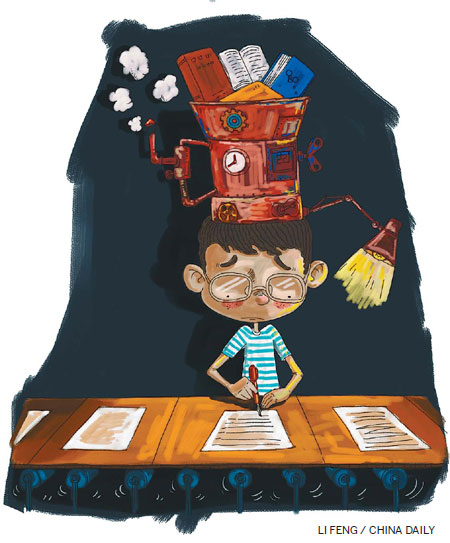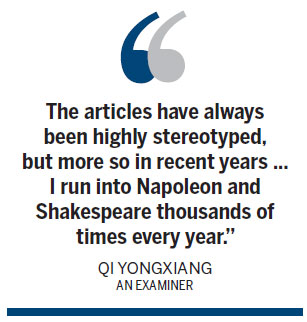The write stuff leaves students at a loss for words
Updated: 2012-07-17 08:31
By Tang Yue (China Daily)
|
||||||||
Sticking to a script is more important than originality, Tang Yue reports.
Zhang Xiao was recently given a school assignment that asked him to write an essay about his ideal job. The 10-year-old Beijing pupil responded by writing that he wanted to be the head of a large business.
|
 |
"You want to be a boss, that's OK. But you shouldn't end your article like this. You should write 'I want to do charitable work with the money I earn'," his teacher commented.
Zhang's mother, Chen Chen, said she could see the point of the teacher's advice but suggested a different approach. "Don't you think it is a little bit over the top? He's only 10. We've always instructed him to help those in need. But charity? I don't think he really understands the word at the moment.
|
 |
"Students are not encouraged to express themselves freely. Morality always comes first. Every person in a story is expected to be lofty, kind-hearted and courageous. It's no different from 30 years ago," Chen said.
She was referring to her own bitter experience in the early 1980s. As a fourth-grader, Chen was given a writing assignment on the topic of "Raising the flag". She described "the weather on that day, who attended the ceremony, who was chosen to raise the flag" and other points that interested her.
However, despite her honesty, Chen's essay was deemed "a very bad example", and she was rebuked by the Chinese-language teacher in front of her classmates.
The teacher didn't explain to Chen why her work was unacceptable, but the young girl quickly identified a major difference between her story and those that were given high scores: The other children had written sentences such as "The red flag was dyed by the blood of the martyrs," or "The flag reminds us of the sacrifice the heroes made". Those sentiments were missing from Chen's piece.
"I still can remember how I was humiliated by the teacher," recalled Chen, 41. "And I was rather confused. It is true that I didn't think of the martyrs, so why shouldn't I tell the truth?"
This is the unwritten rule for Chinese students: You can write what you think, but make sure it reflects your "positive thinking". Exaggeration is not something to be avoided, instead it's a necessary technique. Integrity is not bad, but it can be compromised to enhance a good story.
Han Han, a high school dropout and probably the most popular blogger in the world - his site on Sina, a Chinese web portal, has registered more than 576 million hits - wrote on his blog that children are taught to lie when they start writing in Chinese-language lessons.
Meanwhile, in a survey conducted by China Youth Daily's social research center in 2010, 83 percent of the 2,639 respondents admitted they had lied in their school essays.

 Relief reaches isolated village
Relief reaches isolated village
 Rainfall poses new threats to quake-hit region
Rainfall poses new threats to quake-hit region
 Funerals begin for Boston bombing victims
Funerals begin for Boston bombing victims
 Quake takeaway from China's Air Force
Quake takeaway from China's Air Force
 Obama celebrates young inventors at science fair
Obama celebrates young inventors at science fair
 Earth Day marked around the world
Earth Day marked around the world
 Volunteer team helping students find sense of normalcy
Volunteer team helping students find sense of normalcy
 Ethnic groups quick to join rescue efforts
Ethnic groups quick to join rescue efforts
Most Viewed
Editor's Picks

|

|

|

|

|

|
Today's Top News
Health new priority for quake zone
Xi meets US top military officer
Japan's boats driven out of Diaoyu
China mulls online shopping legislation
Bird flu death toll rises to 22
Putin appoints new ambassador to China
Japanese ships blocked from Diaoyu Islands
Inspired by Guan, more Chinese pick up golf
US Weekly

|

|






